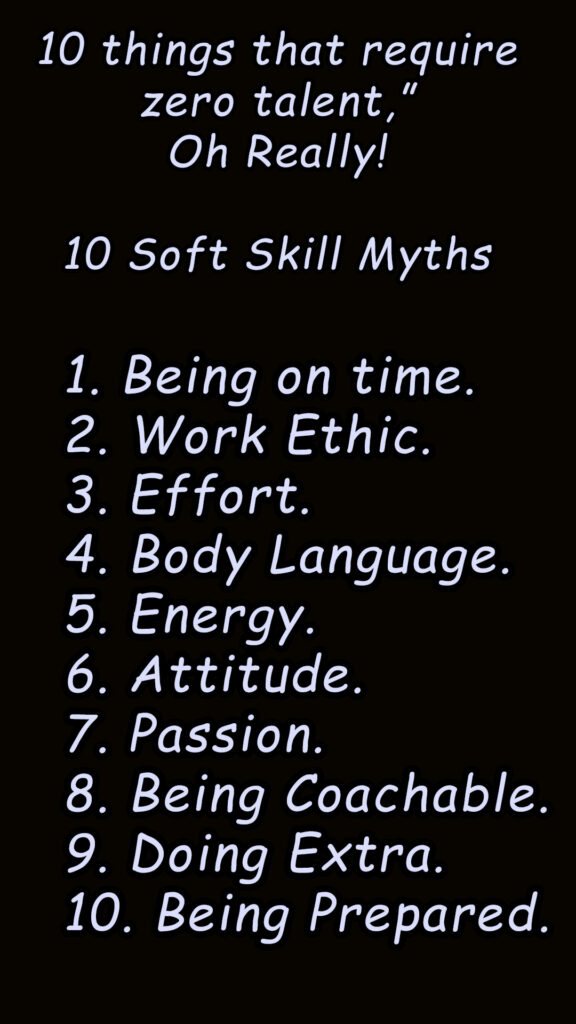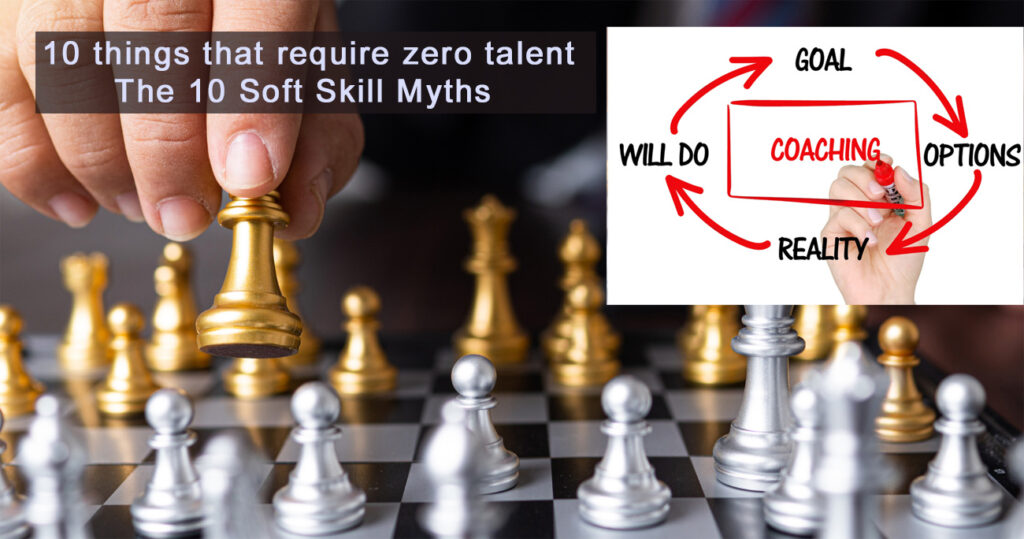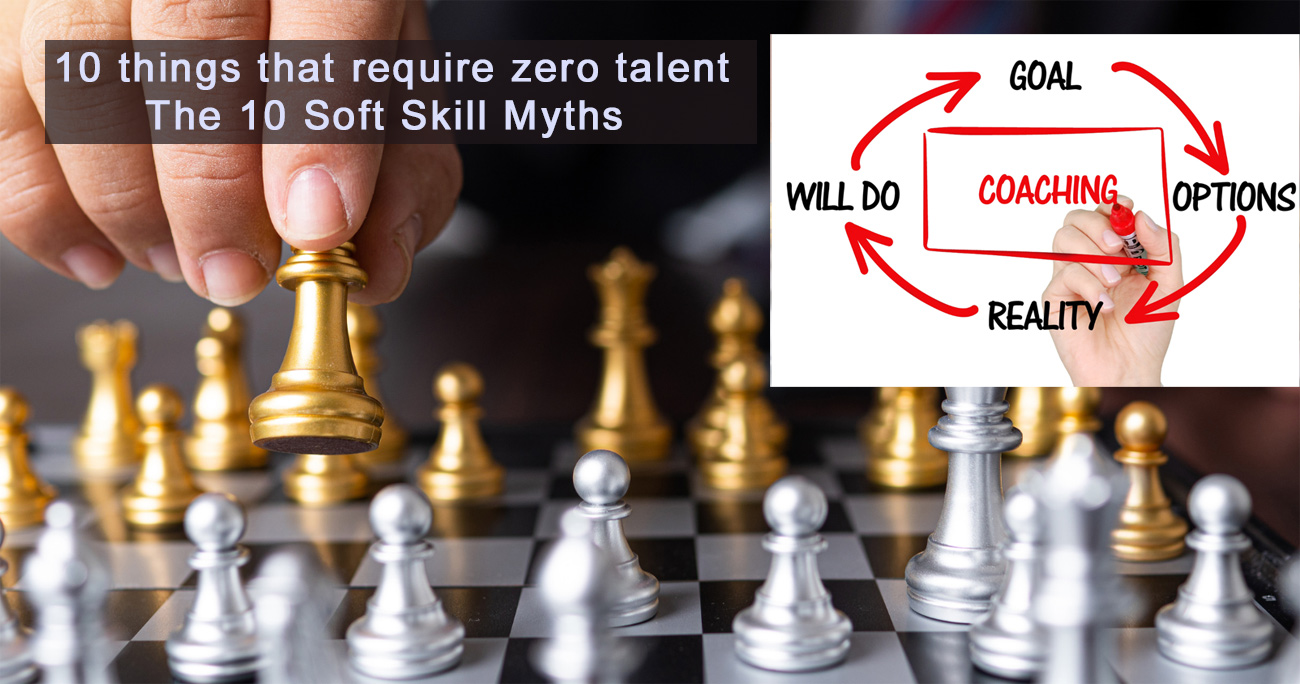“10 things that require zero talent,” Oh Really – 10 Soft Skill Myths
While the 10 things that require zero talent seem like simple behaviors, they would not be quoted so widely if they were easy and everyone did them.
The 10 things that require zero talent are habitual behavior patterns.
People respond with a preferred strategy when dealing with each of the problems presented by each of the10 things. Most people most of the time respond to each ten thing problem with a habitual behavior pattern.
So we can also think of 10 things that require zero talent as part of the day in and day out habits of a person’s life narrative. It becomes part of their script, a part of their subconscious self-image.
It’s the day in and day out rhythms of a life that determine our life narrative. We can change these rhythms with the right strategy and by arranging the environment to support change.
Habits relate to how we are. Developing new habits is how we go from becoming, to being something different, something new.
As a habit these behaviors can, to some extent, be taught. While teaching a new behavior pattern does create new and stronger synaptic connections in the brain, it usually doesn’t totally make up for a lack of talent.
If I learned to play golf, I could develop good golfing habits and be in very good form. But I would never be as good as Tiger Woods. However, I imagine I would be competitive within the groups I would play with.
The point is, I can strive to be the best that I can be. We can all work to reach our own individual potential. In some areas of our lives we may be the best compared to others and in other areas we are, our best.

The 10 things that require zero talent seem simple on first hearing them. However, they are not easy or simple.
The so-called 10 things that require zero talent are essential life skills that are missing from or deficient in many people’s behavioral repertoire. When examined more closely we see the 10 things involve what many consider essential soft skills. These are social, lifestyle, and workplace skills that are not always easy to instill in people, but quite desirable.
This reexamination of the 10 things that require zero talent is in response to a post I saw on LinkedIn. Being somewhat of a contrarian, I of course will see the statement, 10 things that require zero talent, as a bit misleading. Even seemingly simple tasks often take more skill and talent than we give them credit for.
Some of the ten things are more skill than talent. Defining skill vs talent can be very fuzzy and unfocused. The definition turns out to be many shades of gray. I’ve heard different definitions of both talent and skills used by business workplace trainers.
I think of talent as being natural ability or natural skill, and skill as behaviors that are capable of being taught at the present time. What was once a skill can become a talent over time and under the right conditions. Skills can become a natural part of a person’s behavior and self-identity. This is the process of going from becoming to being.
Both talent and skills can be used more effectively by following better strategies. A person’s personal rules about social responsibility and work play a big role in how basic talents and skills are developed and used.

Yes, people often call these soft skills. I think labeling them soft skills diminishes their importance. When examined, we instead see they are essential basic skills. What we need to ask is whether traditionally called soft skills are just nice to have or are they essential to one’s life, relationships and/or the job/task.
“10 things that require zero talent,” are really the 10 Soft Skill Myths
- Being on time.
- Work ethic.
- Effort.
- Body Language.
- Energy.
- Attitude.
- Passion.
- Being coachable.
- Doing extra.
- Being prepared.
Let’s take a closer look at the 10 things that require zero talent
Or
10 things that require subtle but essential talent, the reexamined version.
Being on time.
Being on time requires time management, a certain degree in planning, and predictive skills.
While most of these skills can be taught and brought under the control of managed cues, there is a degree of innate ability for attending to time and planning to depart the starting location, along with planning and implementing travel strategies for arriving at the destination.
I find the farther away I need to drive the more talent it takes to get there on time. One needs to check and predict traffic conditions. Have a strategy for unforeseen delays, such as accidents and police activity. Planning includes estimating if the vehicle can get to the destination without the need to refuel. One also needs some level of ability to estimate travel time. All of these planning and predictive activities require a strategy and may be more complex than first realized.
Work Ethic.
Now I do question whether this is more a skill or a trait/talent. On first thought I think of a work ethic as being part of a cultural norm. This would bring it under the control of cultural rules. The style of one’s work ethic will be maintained and rewarded within the culture the individual identifies with. While it may start as a skill based cultural rule early in life, it most likely becomes a talent in adolescents and early adulthood.
There are variations between individuals within these cultures. Some of this variation is due to talent. Some people are more talented at conforming to the cultural expectations of how one should work. Others simply enjoy working. So we find some people within all groups that like to work more than what is average. Most people will fall within an acceptable range.
Effort.
Effort may be more of a trait and therefore more of a talent than being on time. Some people are programmed to give a lot of effort regardless of the reward. This is most likely a combination of nature and nurture. I imagine genes account for some of this, but a lot of it is derived from the cultural rules of the group and it is most likely developed in early childhood.
The system one operates in can also have a profound effect on how much effort people exert. If people find joy in their work, they are more likely to put in a lot more effort. In general, if the work is aversive, people are more likely to exert less effort. There are exceptions. But exceptions are not common in the majority of work environments.
I once knew a very attractive young lady who was quite clever in figuring out how to put the least effort into work as possible. This can be good if it produces the same results. However, as with the gal I’m referring to, it’s often simply to avoid getting the job done. In this case, she would defer the work, so someone else needed to do it.
There are other people who find satisfaction from working hard and doing the best job possible. These people find the effort of goal achievement as rewarding as the goal. They find some intrinsic joy in the work.
With the proper training and motivation even the pretty girl I mentioned earlier can learn to put more effort into tasks.
Body Language.
Body language is both a skill and a talent. It is a skill in that one can learn to have better posture, mirror others, and use spatial positioning.
It is a talent in that some people can innately use the proper body language for a given situation. They can switch on the friendly customer service persona even when they’re in a different mood. Again this is most likely because of how the person processes information and how they react to it. How a person reacts to stress is part of their genetic makeup and personality. In other words, their innate talent. However, once again we can improve most people’s ability to project a more positive image through body language with the proper training.
A tactic for helping people change their body language is by helping them change their mood. When people learn how to change their mood they naturally display more positive body language. Teaching the skills and harnessing the talent for moderating a person’s mood is a workplace skill most employers are not equipped to do. On the other side of the coin, most people will not pursue mood changing drills in earnest.
Sometimes there is a reason for weird posture.
When working dogs, I always think people find my body language puzzling. This is especially true when I have drooped shoulders and freely hanging arms. I imagine I look a bit peculiar. I never expect people to model that particular bit of behavior, but I do it for a purpose. It is a type of preparatory behavior. I am anticipating a problem and getting ready to intervene with the proper timing.
I also have a weird posture a bit hunched over with my head down and to the side watching the dog or dog and handler. This is so I can more easily isolate my visual field to better read the dog and handler team. The trick with this is to also be aware of other important variables in the environment. Electric cars have increased the risk of this behavior. Hence it has been modified a bit. Sometimes what seem like unrelated skills need to change to match changes in technology.
There are many forms of meta-communication.
It is not only Body Language we need to pay attention to. We need to consider all meta-communication. Body language is most often mentioned because it’s easy to see and over the last 30 years has been talked about a lot. People are aware of body language and not so familiar with other aspects of meta-communication.
Energy.
Energy is also a trait that may be equated to talent. Some people have a higher level of energy than others. This is more a biological trait that has some to do with metabolism. It can to some extent be controlled through eating properly, getting the required amount of sleep, and rest. In addition having the proper mindset and not spending valuable computational/ information processing energy on wasteful activities such as worrying can also help.
I used to say it would take 7 people to replace me. That was when I was younger, now I think it would only take 3. I also find that after working particularly tough dogs for 3 or 4 hours straight, I can get quite fatigued. But after a little rest of maybe 5 or 10 minutes I can get back to work. But my energy level is down from 20 years ago.
One’s energy level also depends on how much effort is needed. We all process information differently and we all have different levels and abilities of executing behavior. Some people use more effort in performing certain tasks than others. With training we can often make the execution of a task more efficient, which in theory should allow the person to conserve energy. By conserving energy one will be able to work at top efficiency for longer periods of time.
Attitude.
Wow, this one is a real talent. One’s attitude can be faked for a short period of time, but it will tend to drift back towards a base level at some point. Put someone under stress and see how much control of attitude there is.
There are techniques for maintaining a good attitude, or perhaps I should say an appropriate attitude. There is training to make one competent in stressful scenarios. There are focusing techniques to help center one in chaos. But how one innately handles stress when performing a difficult task has a lot to do with the person’s physiological/psychological makeup. A person’s behavior is influenced by how affected they are by stress and how they process the stressful situation. I have seen some people perform their best when under stress. It is interpreted as a challenge to them. I have seen others completely fall apart when under the same kind of stress. One’s attitude is most definitely a talent.
Passion.
Passion for an area of endeavor is also a talent. It is hard to make someone passionate about a subject. There are edge cases where it is common. I am talking about the average person in the average domestic setting.
People have an affinity for different pursuits.
We all have an interest in different skills and pursuits. I imagine many of our interests are linked to our innate talents. What we are successful at tends to be areas we’re more interested in. If an individual finds an activity rewarding, they’re much more likely to be passionate about it.
If a person finds an activity aversive they are much more likely to be dispassionate about it.
However there are the passions driven by aversives as well. If we feel righteous indignation we may very well become passionate about fighting that injustice. Sometimes a person or group’s passions can be quite detrimental to a business. At other times they can be harnessed and used to drive effort, a strong work ethic, resilience to stress, increased energy, and extra work.
Being Coachable.
Being coachable this is a tricky one. It all depends on what is meant by coachable. If coachable means being unscrupulous, then it is definitely a talent. When younger and working for people that said all you need is to be coachable, what they really meant was you need to have the ability to be somewhat pathological. Being deceitful and harming others really goes against some of my well ingrained personal traits. In this case I am not coachable.
If coachable means taking advice and finding strategies to incorporate it into my behavior patterns. Then I am more malleable.
If the learner has strong competing commitments against what is being taught, then they will be hard to coach. To be coachable there needs to be alignment between the subject matter, the learner’s values and beliefs, and the coach’s presentation.
If the teacher puts too much stress on the learner, it can make the learning experience aversive. However, it may help some learners with a certain personality type acquire the information more quickly. It’s ideal if the coach and learner are matched in teaching and learning styles.
Doing Extra.
Doing extra involves some kind of reward experience. This reward in a work environment is usually tangible. Even if putting forth extreme effort is rewarding in itself, doing extra usually requires that the doer sees some results from the extra work. It could be the work is at a higher level, this would be pride of workmanship.
I know I always try to give more than what is expected.
It could also be overtime pay or some other type of utility that translates into an economic or personal win.
I have had jobs where the employer did not want you to work too much. They did not want to pay for overtime and were quite good about paying for the time you worked.
I have worked with others who like you to work extra without any incentive. They want extra work but don’t want to pay for it. These, “work for me for free,” employers don’t acknowledge the extra work and treat it quite differently. Their attitude seems to be the worker is the slave and they are the all-powerful business owner. These businesses always seem to have a very high turnover rate with employees. What I’ve seen is the only way to have the Master business owner persona is if you pay very, very well. Then people will put up with you for the money.
Being Prepared.
Being prepared is a skill with an underlying degree of talent.
Being prepared is really about planning. There are strategies that can be taught so that one is prepared, especially for repeatable tasks. The personality trait that influences the pre-task activities often involves the ability and desire to do research, ability and desire to mentally rehearse the activity, and developing a hypothesis about how the task will unfold.
The last one requires the ability to be talented in predictive analysis. Experience plays a part in this as well as one’s innate ability to anticipate problems and be prepared for them.
In some scenarios preparation requires one to work within a team. The team’s collective knowledge can be used to prepare for the event. When a team is involved one’s coachability can also be a factor in the outcome.
